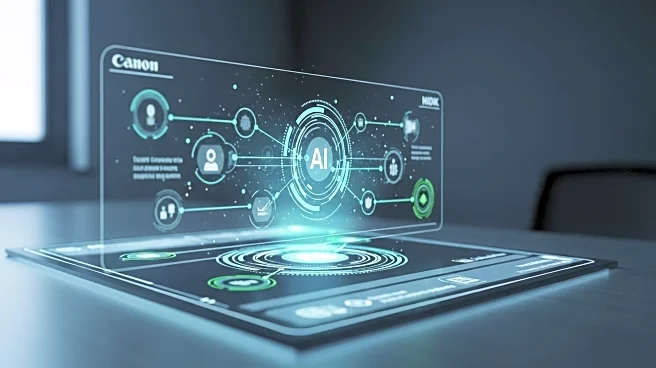What is the story about?
What's Happening?
Cisco has announced the introduction of new agentic capabilities designed to enhance collaboration between humans and AI in the workplace. At the WebexOne 2025 event, Cisco unveiled solutions that integrate AI agents into its Webex platform, aiming to improve productivity and streamline workflows. These innovations include the Cisco AI Assistant, RoomOS 26 for Cisco Devices, and integrations with Microsoft 365 Copilot and Amazon Q index. The AI agents are designed to automate routine tasks, such as generating action items from meeting transcripts, transcribing and summarizing meetings, recommending live polls, and scheduling meetings. Cisco's approach, termed 'Connected Intelligence,' seeks to create blended teams of humans and AI agents that collaborate securely and efficiently.
Why It's Important?
The introduction of AI-driven collaboration tools by Cisco is significant as it represents a shift towards more integrated and efficient workplace environments. By automating routine tasks, these tools can potentially increase productivity and reduce the time employees spend on administrative duties. This development is particularly relevant for industries that rely heavily on remote work and digital communication, as it enhances the ability to manage and optimize workflows. The integration with platforms like Microsoft 365 and Amazon Q index further expands the capabilities of Cisco's collaboration tools, offering users seamless access to enterprise data and applications. This move positions Cisco as a leader in the AI-driven collaboration space, potentially influencing how other companies approach digital teamwork.
What's Next?
Cisco plans to roll out these AI capabilities with general availability starting in Q4 2025 and Q1 2026. The company is also working on integrating advanced threat detection features to ensure secure digital collaboration. As these tools become widely available, organizations may need to adapt their workflows to fully leverage the benefits of AI-driven collaboration. Stakeholders, including IT teams and business leaders, will likely focus on training employees to effectively use these new tools and on optimizing their digital infrastructure to support enhanced collaboration. The broader adoption of AI in workplace collaboration could lead to increased demand for similar solutions across various sectors.
Beyond the Headlines
The integration of AI into workplace collaboration tools raises important ethical and cultural considerations. As AI agents become more prevalent, organizations must address concerns related to data privacy, security, and the potential impact on employment. Ensuring that AI systems are used responsibly and transparently will be crucial in maintaining trust among employees and stakeholders. Additionally, the shift towards AI-driven collaboration may influence workplace culture, encouraging more dynamic and flexible work environments. Long-term, this development could lead to significant changes in how organizations structure their teams and manage their operations.
















